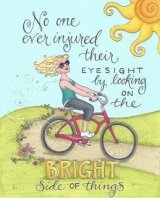|
What we feed our bodies feeds our eyes.
Many of the vitamins and minerals in our bodies are found in much higher concentrations in our eyes, so a diet lacking in these vitamins and minerals can lead to vision problems as we grow older. Take the time every day to give your eyes (and the rest of your body) the nutritive support they need. Eat the foods and take the supplements that provide the antioxidant vitamins and minerals your eyes require. You’ll Protect Your Eyesight, ensuring years of good eye health, and increasing the odds that you’ll avoid blindness or vision loss for the rest of your life. If you find this newsletter useful, please do a friend and us a big favor and "pay it forward." Forward this issue to all your friends. If a friend passed this issue along to you, and you like what you read, please subscribe by visiting... Protect Your Eyesight Table of Contents"Roses are red, violets are blue, I’m sneezing and coughing and my eyes itch too!" If April and May brings you not only spring flowers but itchy, watery, red, or swollen eyes, you may be one of millions of people who suffer from eye allergies. Though you may feel like you’ve gone 10 rounds, eye allergies are no different than other allergies, all of which are caused when the immune system becomes sensitized and overreacts to a foreign substance (called the allergen), usually something that is otherwise harmless. The allergen causes certain cells in the eye (mast cells) to release histamine, a chemical produced in reaction to a substance that the immune system can't tolerate. Histamine and other chemical mediators are responsible for the symptoms of allergic reactions. Though mast cells are found throughout the body, there are very high concentrations of them in the eyes. Birds Do It, Bees Do It Although there are many types of allergens—from pet hair or dander to dust mites and molds—one of the most common is pollen. Some plants are pollinated by bees and other insects; these plants usually have brightly colored flowers and sweet scents to attract pollinators, and they seldom cause allergic reactions. Our culprits are the plants that rely on the wind to pollinate them. These plants have small, drab flowers and little scent; they are the plants that cause most allergic reactions, or hay fever. Weeds usually pollinate in late summer and fall, and weather affects how much pollen is carried in the air each year. According to the Asthma and Allergy Foundation of America (AAFA), the weed that causes 75 percent of all hay fever is ragweed—just one ragweed plant is estimated to produce up to 1 billion pollen grains! Trees pollinate in late winter and spring. Some tree species whose pollen can trigger allergies include hickory, beech, cedar, birch, cottonwood, elm, maple, and oak. Grasses, meanwhile, pollinate in late spring and summer. Among those that can cause allergic reactions are Kentucky bluegrass, timothy, Johnson, redtop, Bermuda, and rye. Interestingly, though environmental factors like cigarette smoke, perfume, and diesel exhaust may irritate your eyes and make your symptoms worse, they do not in and of themselves trigger an allergic response. An Inconvenient Truth According to a 2002 study by Harvard University researchers, rising carbon dioxide levels could lead to an increase in the incidence of allergies to ragweed and other plants. The study found that “ragweed grown in an atmosphere with double the current carbon dioxide levels produced 61 percent more pollen than normal.” Atmospheric carbon dioxide is expected to increase significantly over the next 30-50 years. Higher pollen counts ... higher gas prices ... all the more reason to buy a Prius!
Vision Facts of the Month * Eye allergies, also known as allergic conjunctivitis, affect millions of Americans. As much as 22 percent of the population has eye allergies. * Almost three-quarters (73 percent) of allergy patients who take medication also suffer from allergy eyes.
Learn which eye vitamins naturally improve eye health. The Rebuild Your Vision Ocu-Plus Formula was designed to improve vision and eye health, and help people with Macular Degeneration, Glaucoma, and Cataracts. Click Here To Learn More.
Learn which eye vitamins naturally improve eye health. The Rebuild Your Vision Ocu-Plus Formula was designed to improve vision and eye health, and help people with Macular Degeneration, Glaucoma, and Cataracts. Click Here To Learn More.
Comments? Ideas? Feedback? We want to hear from you with your complaints, compliments or suggestions. That's the only way we can make EyeSight Vision Care! more useful for you. Have something to tell us? Click on Reply in the menu and tell us what you think! |
More Information
Vision Training for GOLF...
"Everything you wanted to know about how your eyesight affects your game, with self tests and tips to aid alignment, reading greens and judging speed and distance. Much more fascinating than it sounds."- Golf Magazine - Click Here!


